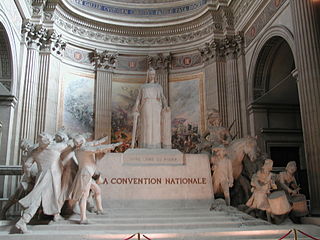Jean-François Reubell or Rewbell was a French lawyer, diplomat, and politician of the Revolution.

The Council of Ancients or Council of Elders was the upper house of French legislature under the Constitution of the Year III, during the period commonly known as the Directory, from 22 August 1795 until 9 November 1799, roughly the second half of the period generally referred to as the French Revolution.
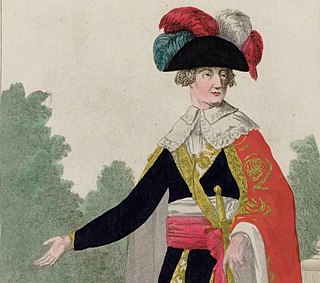
Jean-François-Auguste Moulin was a member of the French Directory. He had a long career as a military officer serving France in the Royal Army of King Louis XVI, the Garde Nationale of the French Revolution, and the Grande Armée of Napoleon Bonaparte.
The Coup of 30 Prairial Year VII, also known as the Revenge of the Councils was a bloodless coup in France that occurred on 18 June 1799—30 Prairial Year VII by the French Republican Calendar. It left Emmanuel-Joseph Sieyès as the dominant figure of the French government, and prefigured the coup of 18 Brumaire that brought Napoleon Bonaparte to power.
François Sébastien Letourneux (1752–1814) was a French lawyer and politician who was Minister of the Interior under the Directory.

Jean-Antoine Marbot, born 7 December 1754 in Altillac (Corrèze), died 19 April 1800 in Genoa (Italy), was a French general and politician. He belongs to a family that has distinguished itself particularly in the career of arms, giving three generals to France in less than 50 years.

François Cacault was a French diplomat of the Revolutionary and Napoleonic periods.

Jean-François Roger, sometimes called François Roger, was a French politician, journalist, poet and dramatic author. During the Revolution, at 16 years of age, he and his family were imprisoned for seventeen months for singing royalist songs. He was a civil servant, and he entered l' University where he published works of school literature. He was later appointed Professor during the Empire and Restoration. He was elected member of the French Academy, as a replacement for Suard, on 8 August 1817 and received by the duke of Lévis on 30 November next. His election was widely criticized. He was a member of the Commission of the Dictionary where he fought the Lacretelle proposal, accepted Villemain and the count of Holy-Aulaire and voted against Victor Hugo. He was one of the companions of the “Lunch of the Fork”. Of his comic and lyric works, sometimes written in collaboration with Etienne de Jouy, his greatest success is a comedy in verse, in three acts: L'Avocat, played for the first time at the Comédie-Française.

Étienne Victor Mentor was a politician from Martinique who served and represented Saint-Domingue in the French parliament from 1797-1799.

Charles-Jean-Marie Alquier was a French diplomat. He served as French minister in several European capitals.

Alexandre François Auguste Vivien was a French lawyer and politician. He was Minister of Justice during the July Monarchy, and Minister of Public Works in the French Second Republic.

Claude Ambroise Régnier, Duke of Massa was a French lawyer and politician. He was a deputy in 1789, a member of the Council of Ancients, a member of the Senate and a Minister.
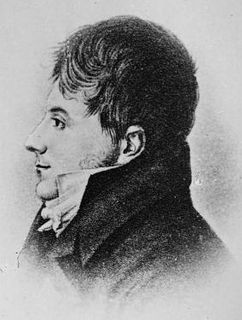
Jules Jean Baptiste Anglès was a French politician who was Minister of Police for a short period in 1814.
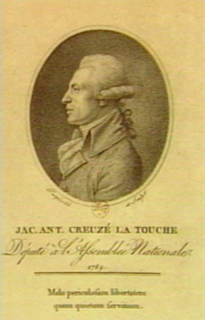
Jacques Antoine Creuzé-Latouche was a French lawyer, Jacobin, and member of the National Convention of France during the French Revolution.
Jean Joseph Victor Génissieu was a French lawyer and politician who was in turn president of the National Convention, Minister of Justice and president of the Council of Five Hundred during the French Revolution.

Jean-Charles Abbatucci was a Corsican lawyer and politician who was a Deputy for Corsica during both the French Second Republic and the French Third Republic. He was a committed Bonapartist throughout his political career.

Nicolas Joseph Péraldi was a French notary who was Republican deputy of Corsica from 1881 to 1885, then senator of Corsica from 1885 to 1894 and again from 1909 to 1912.
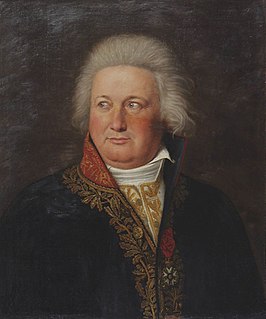
Jean-Pierre Lacombe-Saint-Michel, born 5 March 1751 and died 27 January 1812 in the château de Saint-Michel-de-Vax (Tarn), was a French general in the French Revolutionary and Napoleonic armies.
Louis Félix Roux, was a French politician.




